BY AMADIN UYI
When the International Monetary Fund approved a $3.4 billion emergency funding for Nigeria in April 2020, it was the single biggest disbursement for any country to help tackle the coronavirus pandemic and bring relief to millions of Nigerians. Many thought Nigeria was on the right path to addressing the challenges brought about by the pandemic and easing the burden brought upon citizens, however, 10 months down the line, there are fears that the loan did not achieve its purpose and should never have been taken.
The IMF in a statement by Mitsuhiro Furusawa, its deputy managing director, had said that the funds would provide much-needed liquidity to respond to Nigeria’s urgent balance of payments needs which had become severe, taking its toll on the nation’s revenue, following the plunge in oil prices caused by the pandemic.
In April 2020, KPMG had warned that there will be an increase in fraud as a result of the pandemic. It said in one of its publications that “due to the restricted movements, employees and third-parties in remote locations may take advantage of this (pandemic) to falsify records”.
Advertisement
This warning was never taken to heart by the federal government.
Auwal Rafsanjani — executive director of the Civil Society Legislative and Advocacy Centre CISLAC who is also Nigeria’s representative for Transparency International — had also raised an alarm over the massive fraud being perpetrated by government officials and MDAs under the guise of COVID-19 emergency procurement, saying much needed to be done to track COVID-19 emergency relief funds disbursement.
Rafsanjani said despite the fact that “3.4 billion loan from IMF was collected by the Nigerian government, up till today, no explanation of how the money has been spent, no audited report… which goes against even the agreement signed by Nigerian government and IMF”.
Advertisement
Budeshi, a web platform that links budget and procurement data to different public services using the Open Contracting Data Standards, had last year published how several MDAs had accessed the COVID-19 relief funds loaned from the IMF. One of such agencies, Nigeria Security and Civil Defence Corps NSCDC, accessed millions for several key projects.
One of such projects was for the production and airing of jingles at the cost of about N16.9 million as part of its efforts to enlighten the public on the benefits and importance of adhering to COVID-19 prevention protocols.
This prompted an investigation into whether the funds were judiciously used for the purpose for which they were released as the NSCDC had claimed it had awarded the contract to Goodwise Global Services.
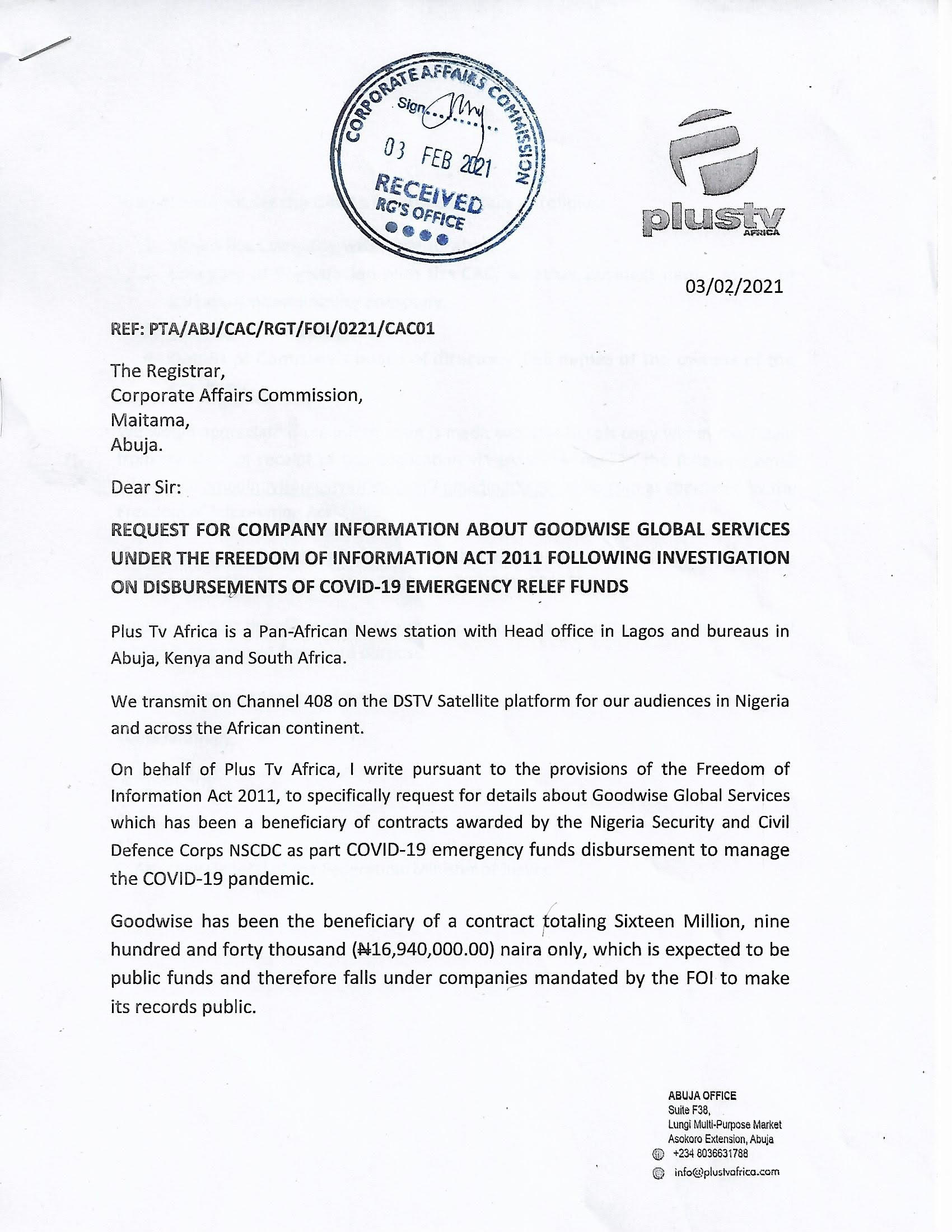
Advertisement
After combing through several private television and radio stations where the supposed finished jingles were meant to be aired, a freedom of information request was sent to the NSCDC to provide details of:
- Contract letter awarding the contract to the above-named company.
- Receipt of payment to Goodwise Global Services.
- Proof of the completed job/online link to the finished jingle/jingles.
- Receipt from media organisations as proof of payment for airing jingles.
- Date and time schedules the jingles were aired.
- List of media organisations that aired the produced jingles.
This request was sent on December 17, 2020, to the commandant-general of the NSCDC, Abdullahi Gana Muhammadu, and was acknowledged on the same day. A copy of the FOI request was forwarded to the office of the attorney-general on January 8, 2021.
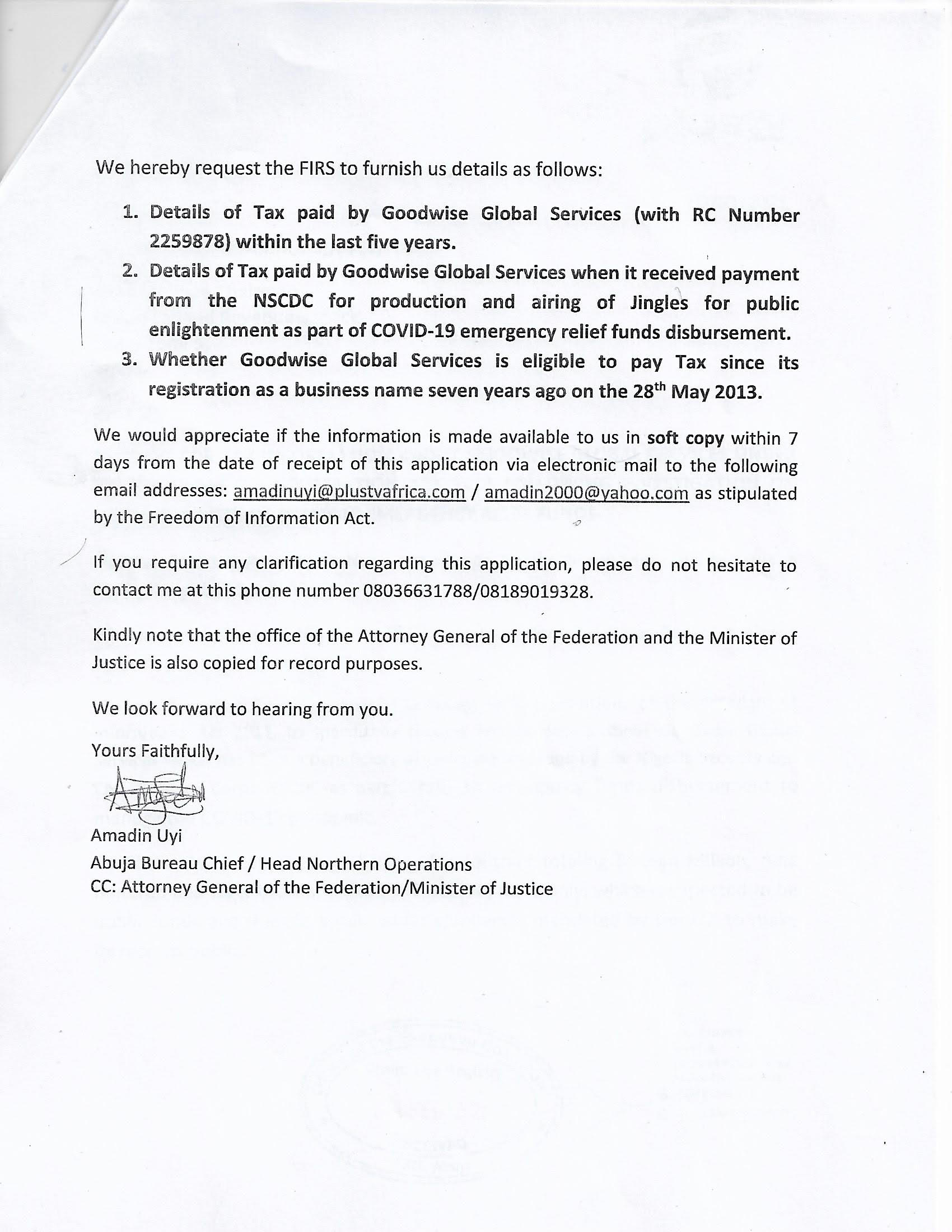
The NSCDC has refused to respond to the request.
Advertisement
Busayo Morakinyo, the team lead of community engagement at Connected Development, revealed that the organisation’s #FollowCOVID19Money project witnessed the same challenge with other MDAs.
Morakinyo said between July 2020 and January 2021, the #FollowCOVID19Money project wrote about 30 FOI requests to MDAs, which were ignored, as many of the agencies could not account for the funds.
Advertisement
“When you refuse to respond to a freedom of information request which is a legal document, it shows that there is something behind the curtains,” Morakinyo said.
Commenting on the development, Rafsanjani said it reeks of a clear case of funds diversion.
Advertisement
“They will not give you any information because they know that the money was actually diverted or some of the money was diverted and therefore they will not give you any credible information that would satisfy your inquiry,” Rafsanjani said.
Further digging was done to ascertain the details of Goodwise Global Services, the company which benefitted from the transaction. Information obtained revealed that it is not a limited liability company but a registered business name which was registered on May 28, 2013. The company has no office within the city centre but uses a residential flat at King’s Court Estate, Jabi district of Abuja, as its official address.
Advertisement
A visit to the estate revealed that it is residential, with no business office within the facility — an indication that the company does not have a registered business address with the Corporate Affairs Commission and probably operates from the suitcase of the owners.
METHOD OF CONTRACT AWARD
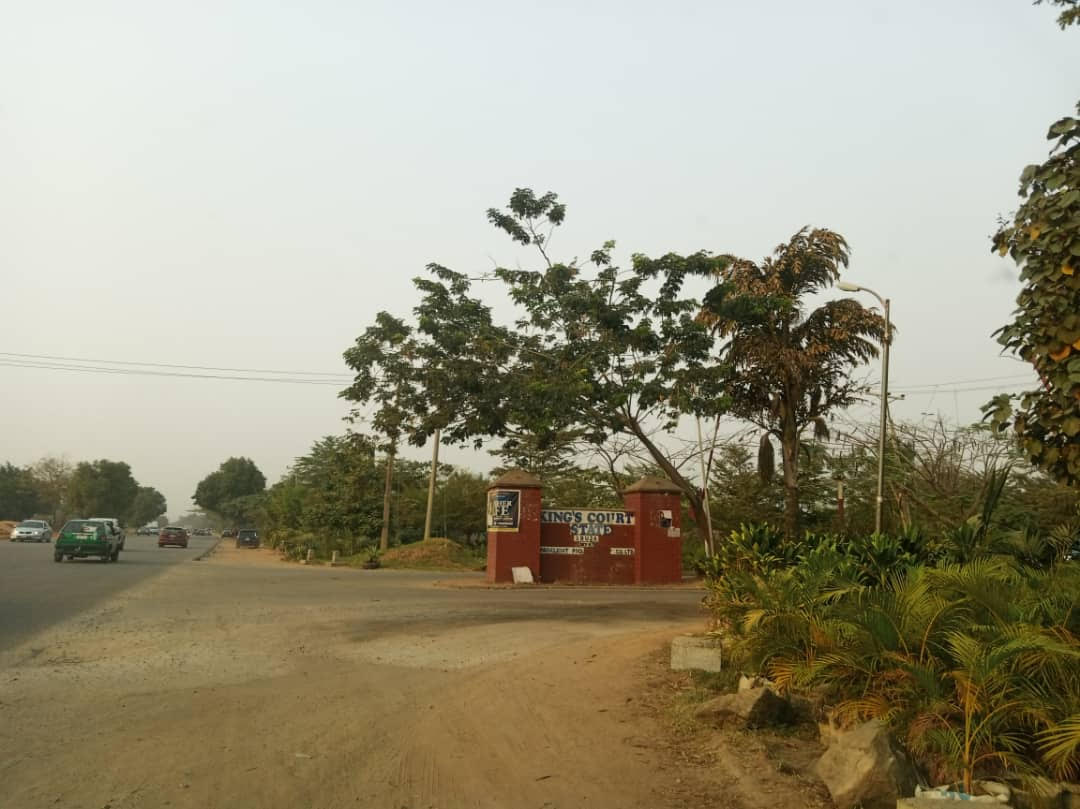
A view of Part 4:2c-g of the Public Procurement Act which looks at the fundamental principles of procurement in government agencies highlights details for contract awards. It stipulates that every procurement must be:
(c) By open competitive bidding.
(d) In a manner which is transparent, timely, equitable for ensuring accountability and conformity with this Act and regulations deriving therefrom.
(e) With the aim of achieving value for money and fitness for purpose.
(f ) In a manner which promotes competition, economy and efficiency.
(g) In accordance with the procedures and timeline laid down in this Act and as may be specified by the Bureau from time to time.
Even the Bureau of Public Procurement which had come up with guidelines on the conduct of public procurement activities by MDAs came up with fresh regulations that would help MDAs function effectively, taking into account the uniqueness of the pandemic.
The BPP stated in clear terms that, following provisions of sections 5(a) and (o) of the Public Procurement Act (PPA) 2007 and mindful of its oversight responsibilities as the regulator of public procurement in Nigeria, the guidelines would facilitate the conduct of public procurement activities in an emergency situation but would still maintain the strictest standards of transparency and accountability.
This reiterated the BPP’s call to ensure activities relating to contract awards are done right irrespective of the situation the world found itself in at the height of the COVID-19 storm. On the competence of the benefiting company, the BPP stated that MDAs would not be allowed to discard technical competence and favour mediocrity.


Segun Omohiosen, the BPP’s head of media, further explained the BPP’s position of eligibility during a visit to his office in Abuja. He stated that all contracting companies must have six major requirements to be eligible to bid or participate in a contract awards process.
He said: “If you don’t have one and you have other ones, you are out of it, that disqualifies you automatically. For instance, if your company is even duly registered with CAC which is number one, you must be certified with PENCOM, certified with NSITF, ITF and FIRS. These five major organizations work seamlessly with the Bureau of Public Procurement.”
He added that the sixth requirement is the BPP’s interim registration report (IRR).
He also added that for procurements like the COVID-19 emergency disbursements, one or two can be discarded but that there are some requirements that are mandatory. “You can be exempted from one or two things but the NSITF is compulsory, FIRS is compulsory and you must be duly registered with the CAC,” he said.
As of the time of filing this report, only a CAC registration has been confirmed for the company Goodwise Global Services.
On January 8, another FOI request was sent to the NSCDC after the seven days given to it had elapsed, but this request was also ignored.

Two FOI requests were also sent to the Nigerian Television Authority (NTA) on January 7 and February 3 to provide records of jingles bordering on COVID-19 enlightenment placed by the NSCDC or by Goodwise Global services.
The first request was ignored but when a second request was sent, the director-general of the NTA replied, claiming he could not accede to the request based on section 15 of the freedom of information act which exempts agencies from third-party information.
The section of the FOI act quoted by the NTA says: “A public institution shall deny an application for information that contains- (a) trade secrets and commercial or financial information obtained from a person or business where such trade secrets or information are proprietary, privileged or confidential, or where disclosure of such trade secrets or information may cause harm to the interests of the third party provided that nothing contained in this subsection shall be construed as preventing a person or business from consenting to disclosure; (b) information the disclosure of which could reasonably be expected to interfere with the contractual or other negotiations of a third party; and (c) proposal and bids for any contract, grants, or agreement, including information which if it were disclosed would frustrate procurement or give an advantage to any person.”
The NTA however did not disclose how the advert placement using public funds could harm the interest of the NSCDC or Goodwise Global Services despite the fact that it owed the public information on how funds were expended. This is the same NTA DG that had told the senate finance committee that it was being owed almost N1.7billion by government agencies which had placed adverts during the COVID-19 pandemic.
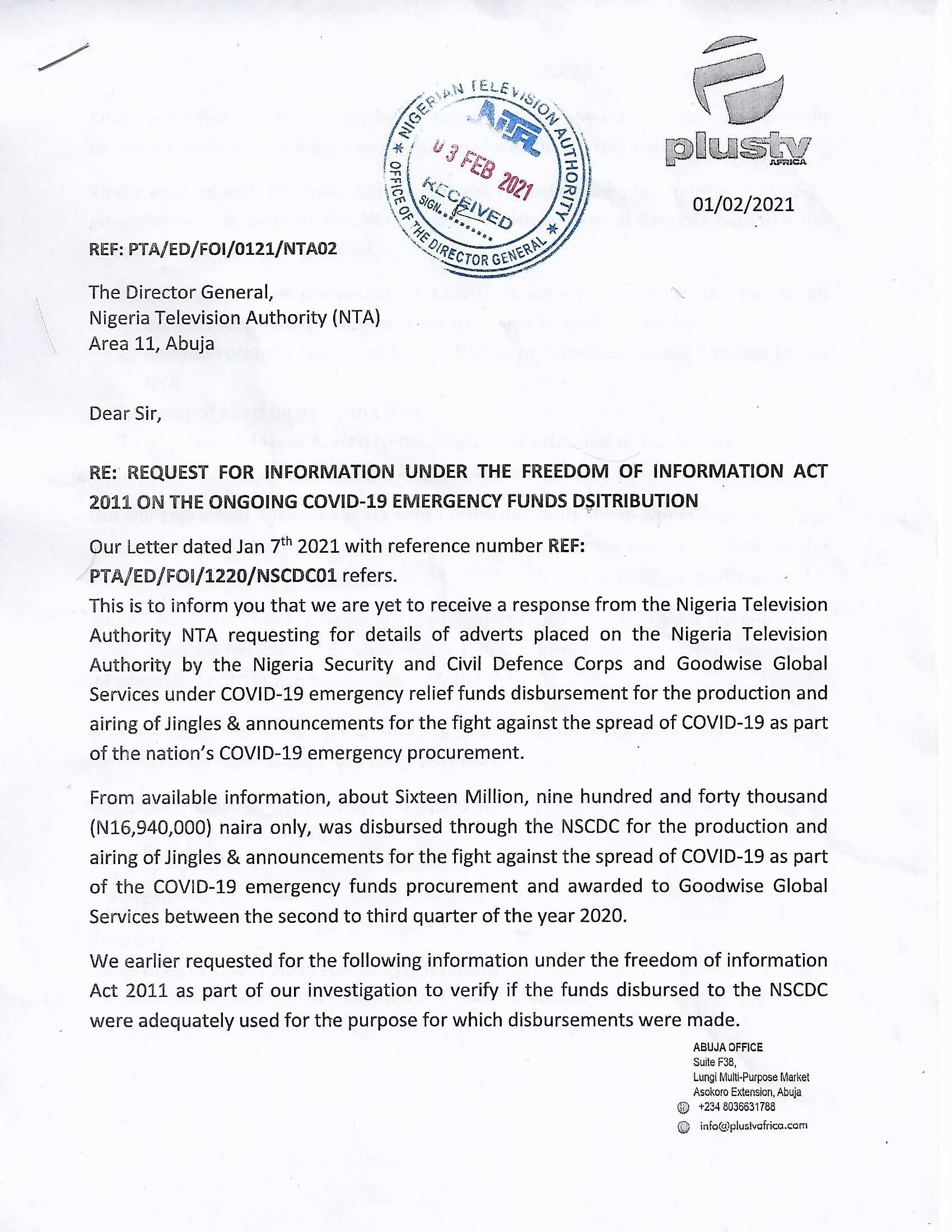
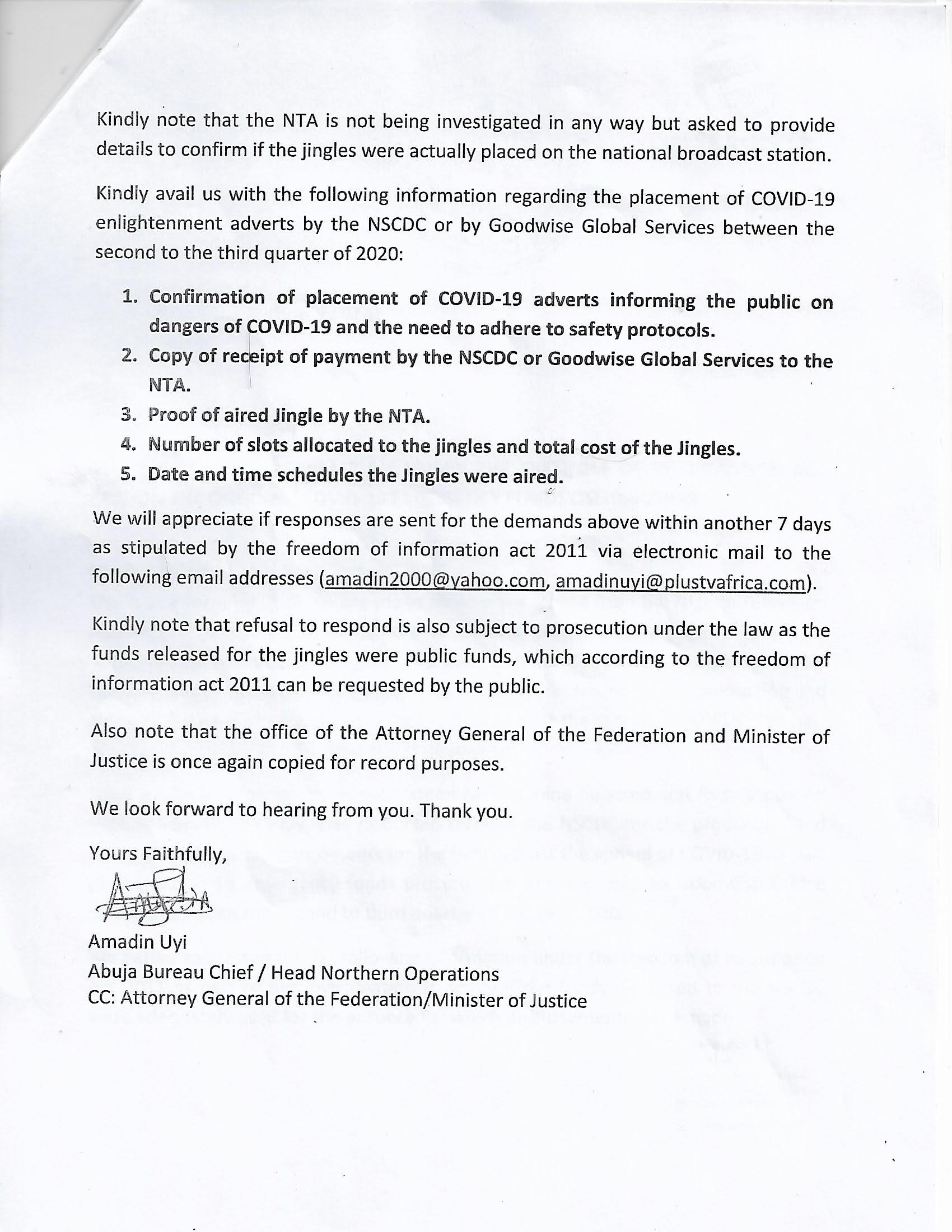
Rafsanjani described the whole scenario as a corruption bazaar with MDAs aiding and abetting each other in their quest to fleece the Nigerian public.
He noted: “Covid-19, unfortunately, brought more corruption than even the health challenge in Nigeria because public officials at local, state and national level used Covid-19 as a safe haven to divert, siphon and completely steal resources that are meant to deal with issues that concern Covid-19.”
He added that generations of Nigerians will be made to pay for the bazaar witnessed, especially with the way the COVID-19 emergency procurement relief funds were managed.
He said: “Nigerians are the ones bearing the consequences of it. If money is borrowed in the name of Nigerians and some few individuals siphon this money, definitely Nigerians are the ones to suffer. If money is budgeted to provide healthcare system and some wicked people cornered the money, it is Nigerians who are going to lack health care facilities and health care system.”
Che Onyenatumba, a legal practitioner in Abuja, says the federal government should be held liable for the conduct of the MDAs because the government was not clear with guidelines on the criteria for administering the disbursed funds.
He said: “You just can’t give an institution money without them telling taxpayers how the money will be disbursed.”
Onyenatumba thinks the agencies are a reflection of the current Nigerian government, noting that “these persons are a reflection of the body language of this administration because they believe that nothing can be done to them in terms of sanctions”.
Another attempt was made to reach the NSCDC through Okeh Emmanuel, its public relations officer, but he said he had not received any communication regarding the FOI request. Okeh said he was not aware that a letter was submitted and that it had not gotten to his table.
He however assured that if there is a need for anything, the NSCDC will reach the reporter.
A second call was placed to him to ask if a copy could be sent to him electronically, but he refused, saying the FoI request letter was sent officially and would only be handled in an official manner.
With the NSCDC stalling on releasing public details of the amount it accessed from the COVID-19 emergency funding, many will expect the federal government to wield the big stick and clear its name and reputation before Nigerians and the international community by going after these MDAs.
This report is supported by the Public and Private Development Centre and Dataphyte.
1 comments
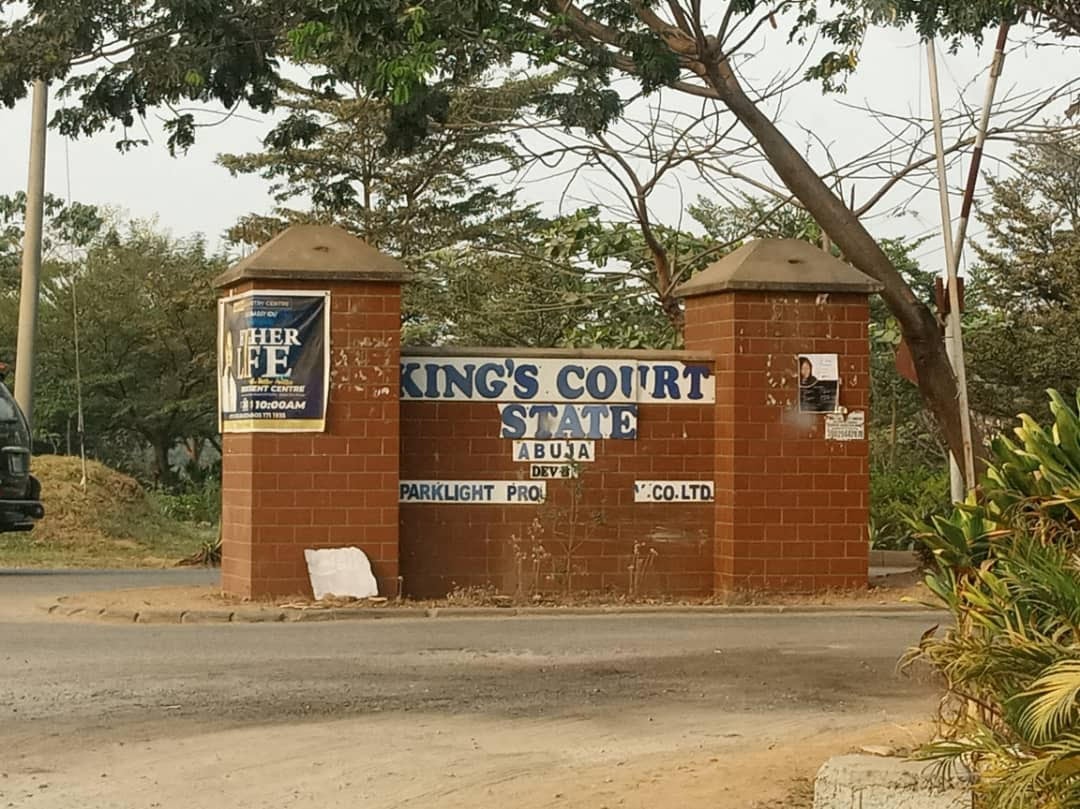


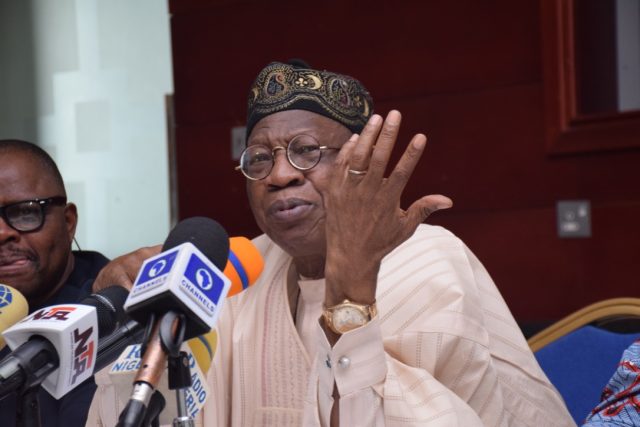
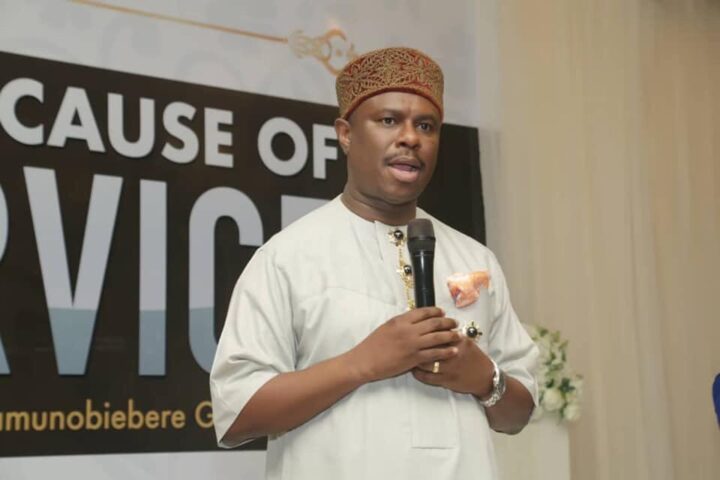
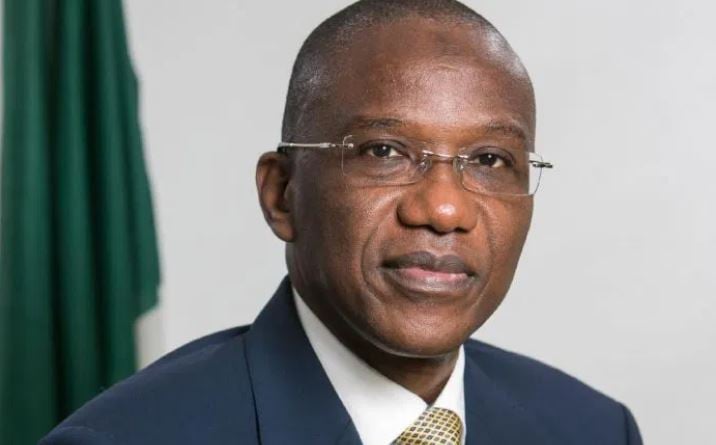
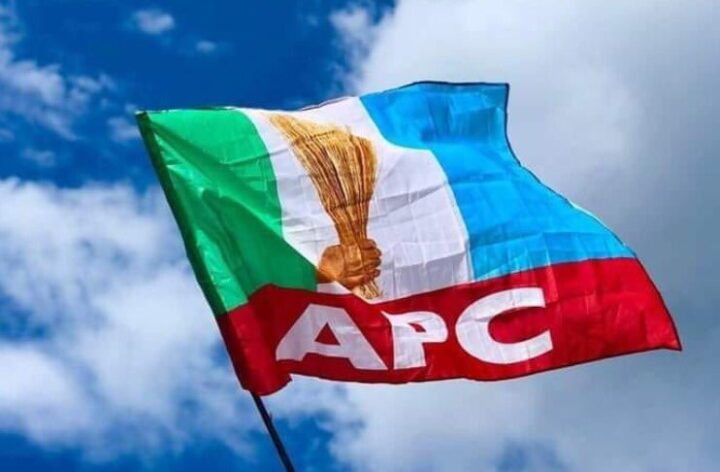
Probe deeper, there are more terrible financial mismanagement under the watch of the former CG.
Also, help us investigate the position of our new minimum wage which Mr President promised us during his “end sars protest” address.